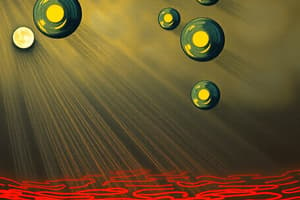Podcast
Questions and Answers
What is mechanical energy?
What is mechanical energy?
Kinetic or potential energy associated with the motion or position of an object.
What is thermal energy?
What is thermal energy?
The total energy of a substance's particles due to their movement or vibration.
What is chemical energy?
What is chemical energy?
The potential energy stored in chemical compounds.
What is electromagnetic energy?
What is electromagnetic energy?
What is nuclear energy?
What is nuclear energy?
What is kinetic energy?
What is kinetic energy?
What is potential energy?
What is potential energy?
What is gravitational potential energy?
What is gravitational potential energy?
What is energy conversion?
What is energy conversion?
What is the law of conservation of energy?
What is the law of conservation of energy?
What is a joule?
What is a joule?
Flashcards are hidden until you start studying
Study Notes
Types of Energy
- Mechanical Energy: Comprises both kinetic energy (energy of motion) and potential energy (stored energy based on position).
- Thermal Energy: Relates to the energy of particles within a substance, stemming from their movement or vibration.
- Chemical Energy: Represents the potential energy stored within the bonds of chemical compounds, crucial for chemical reactions.
- Electromagnetic Energy: Encompasses energy found in light and other forms of radiation, instrumental in various technologies.
- Nuclear Energy: Derived from the potential energy within an atom's nucleus, often utilized in power generation.
Energy Characteristics
- Kinetic Energy: The energy an object possesses due to its motion; calculated based on mass and velocity.
- Potential Energy: Energy held in readiness, stored for future use; can be due to an object's position.
- Gravitational Potential Energy: A specific type of potential energy, determined by an object's height and the gravitational force acting on it.
Energy Processes
- Energy Conversion: Describes the transformation of energy from one form to another, essential in numerous physical processes and technologies.
- Law of Conservation of Energy: States that energy is neither created nor destroyed; it can only be transformed from one form to another.
Measurement of Energy
- Joule: The standard unit of work or energy in the International System of Units (SI), equivalent to the work done when a force of one newton moves an object one meter.
Studying That Suits You
Use AI to generate personalized quizzes and flashcards to suit your learning preferences.




